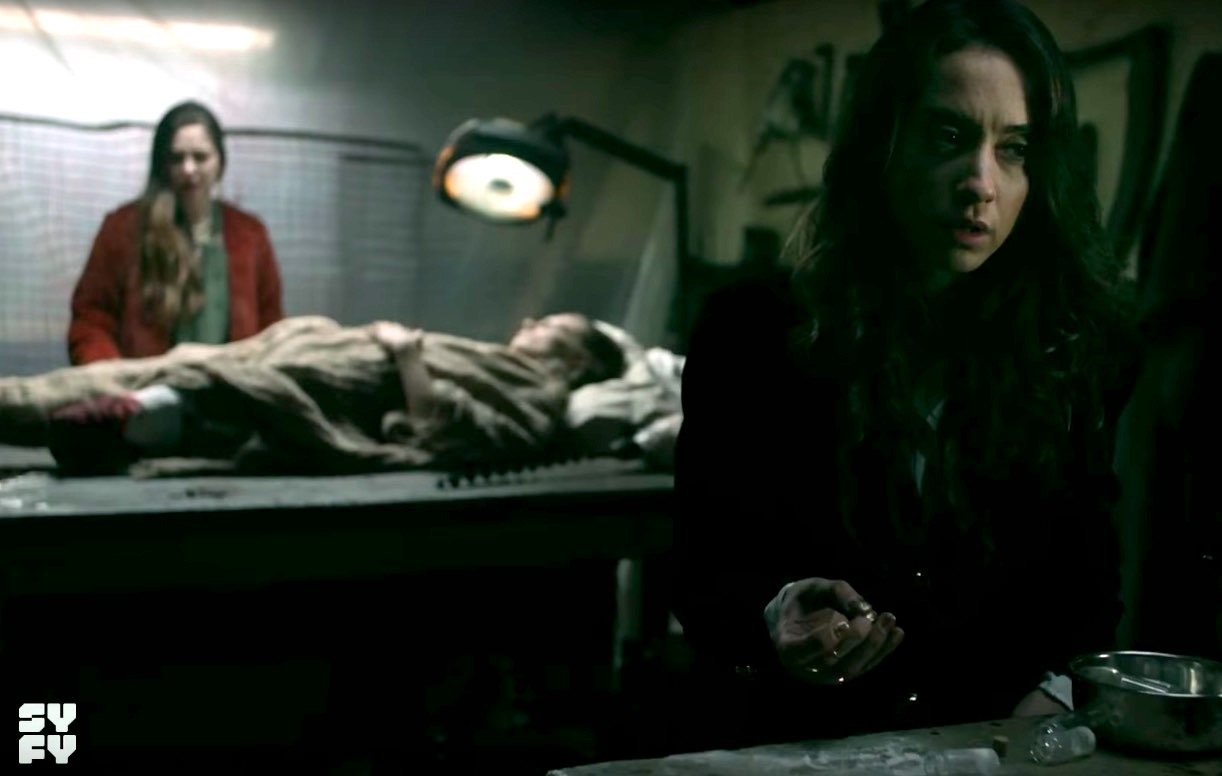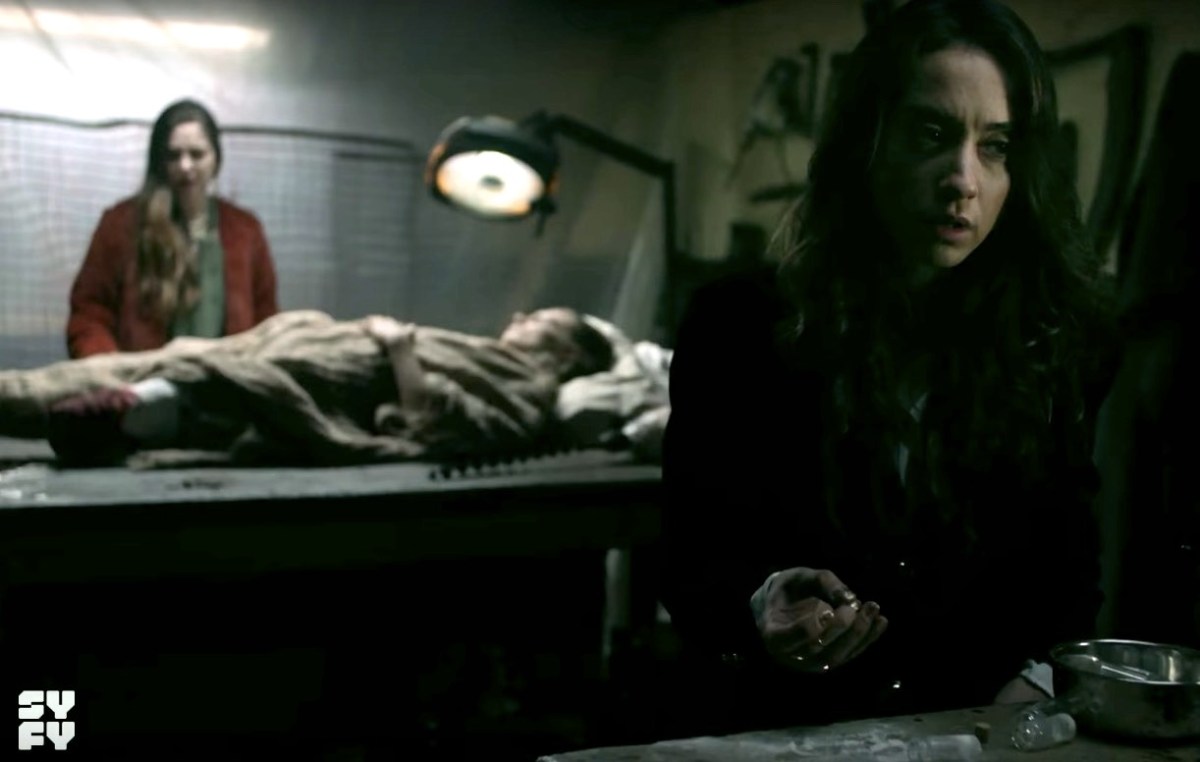Recap: The Magicians’ “Six Short Stories About Magic”


Welcome to our recaps for Syfy’s The Magicians! This week is season 3, episode 8, “Six Short Stories About Magic.”
This is the episode of Syfy’s The Magicians that you show all the people who aren’t watching to get them to watch. “Six Short Stories About Magic” reminds you that it’s not about winning “The Throne Game” but how the story is told. This is not a well-told story. It’s a phenomenally well-told story.
This will also be your favorite episode if the fairies and/or the Netherworld Library biographies fascinate you. If you’re very attached to one character, this episode may not be your favorite, but you know … get over it—it’s about THE MAGIC! However, you may be very happy to see the development of some characters, particularly Fen, Alice, Poppy, Harriet, and Penny.
When thinking about this show, I often feel I don’t give Fen (Brittney Current) enough attention. This also seems to be Fen’s experience with all the people in her life, from her father—who trained her to be married off to a random royal stranger—to the horrible, infant-stealing fairies. Of course Eliot, her royal husband, is guilty of this, too. At least Eliot tries.
He’s really trying in Fillory, with his one scene being a real episode stealer, of course. This is Eliot’s struggle: He knows he’s amazing, but he also knows he has to fight so hard for himself. He can’t help but see this struggle is real with everyone around him, too. This is why I love him and say he’s amazing with no sarcasm. However, I wouldn’t want to be in Fen’s position and be overshadowed by him, despite his empathy. With a character as great as Eliot, it would be so easy to just write Fen as manic pixie nightmare girl or a comically hysterical mom. While, at times, she resembles both of these TV she-demons, she isn’t actually either.
Fen has a personality. She would be horrified to know that I said she sometimes resembles a pixie. She would wish she could be the comically hysterical mom, instead. She’s always had agency. In this episode, she uses that agency to take a break from Fillory and Eliot. Female characters tend to shrink and disappear in larger stories with grief and trauma—women in refrigerators, gone when the narrative was done with them, especially mothers, lest they become a Sarah Connor commando. (I am a HUGE Sarah Connor fan, but her creator did kill her off when he divorced the actress playing her, “reboot” her to be forever 20s, and then lecture the world about feminist characters.)
The Magicians has really turned the tables on this while showing grief and trauma doesn’t always necessarily “make you stronger,” but in Fen’s case, it can lead you to experiences that do, like teaming up with Julia. Shoutout to Julia for figuring out something major that I thought would go multiple episodes without someone getting it. Nope, Julia’s on top of it. Fen is learning about the enemy, and soon she’ll have decisions to make. Julia continues on her path of giving while never being a martyr.
Both Fen and Julia keep their identities with PTSD. Trauma done well in a narrative doesn’t either kill a character or make them stronger, as the saying goes. It does a little of both. The Magicians goes one further: Even if trauma does kill you, you can survive with your weird-self, or in the case of Alice Quinn, your currently knowledge-thirsty-self.
So what the timey-whimey-cloney-womey is going on with Alice? I can say she and Harriet set up an age-old question. Who has the right to knowledge? Should it be everyone? Or just the special few? For us who lack certain privileges, I will say the other question that comes to mind is “Who is to decide who is privileged to knowledge?” Alice seems to decide that she’s the one who is.
Harriet (played by Marlee Matlin) seems to have a different POV. Her “short story” is done in silence with American Sign Language (ASL.)
In her story we learn more about her history with The Netherworld Library. Some of her story is the struggle for independence over safety, and freedom over knowledge. Anyone can relate to this. It’s also a common struggle for people with disabilities. NOTE: So is being really annoyed when people feel they must say, “Anyone can relate to this,” when talking about how the struggle is real for your minority group, because god forbid an able-bodied person should relate to one of us. But, I swear, if you have any feels about the freedom of information and ever felt held back, you could relate to Harriet’s story!
Sera Gamble and David Reed wrote Harriet as a full character with a full agenda that goes well beyond her disability identity. At first, the character wasn’t going to be deaf, but when Oscar-winner Matlin got the role, deafness was intricately woven into her story. Harriet’s revealed relationship with The Head Librarian, Zelda (Mageina Tovah), is realistic without ever being a disability cliché. Young adult Harriet was played by deaf actor Stephanie Nogueras (Switched at Birth). Winter Obidos, who is also deaf, played Child Harriet. All Harriets were scene-stealers. I’m not even sure what Harriet’s full agenda is yet, but I really want to know.
I also loved Harriet’s moment with Alice, who tried to correct Harriet’s grammar—or was it Kady’s, who was her ASL interpreter? FYI Alice: NEVER try to talk to/correct to a deaf person through their interpreter. It’s beyond rude. So, Alice actually learned something new through Harriet. I don’t think Alice Quinn is ableist. She’s being equally elitist with her current decisions. Fan theory: This behavior may get her into a tragic time loop of epic proportions. However, she remains redeemable as she shows empathy for Fen.
Alice corrects Poppy pedantically over the genetic makeup of Travelers. This is where I like doctrinaire nerds like Alice around. Who knew Travelers were actually hybrid beings? Alice, that’s who! Does that mean Penny is part fairy, maybe? With the latest fairy revelations and war crimes, this could be important, not to mention heartbreaking.
Poppy Cline (Felicia Day), our chaotic neutral adventurer, couldn’t care less about any of that, or about Alice correcting her, but for people who claim Day is one-note, I do see conflict in her. For people who think it was unrealistic she slept with Quentin, maybe flip her gender and ask, “What would Indiana Jones do if he were a millennial/xennial woman?” She surely helps move Quentin and the others along. She also asks important questions: “Why is this person doing this? What’s in it for them?”
Penny plays the anti-hero and asks why his story is so important. His old library supervisor, Sylvia, answers him with her deadpan, dry, Daria-like way: “Well, you and your buds are on a quest to restore magic, making you mainly our only hope. No presh.”
This sums up the episode nicely. Thanks, Sylvia.
A fairy may have tweeted something in my ear that next week’s episode might have “So much Bowie coming at you.” (As in David, as in Ziggy God-given-ass, as in Labyrinth, as in the Fairy Goblin King, as in squeaaa!) The fairy tried to sign this to me at first, but because I’m so bad with ASL, they had to tweet it at me. See, there are nice fairies, too. As for Bowie, I can never have too much coming at me. Cancel my first statement—maybe NEXT episode is the one you’ll show people who aren’t watching.
Note: In my last recap, I unintentionally sounded a bit ableist when I wrote, “Get out your ASL books, or glasses to read subtitles.” I was just super excited about Harriet being in this episode! But, this statement assumes the reader doesn’t know ASL. I was writing from my own experience, as someone who tried to learn ASL, but couldn’t without emersion. Of course, you could know ASL for any number of reasons, but if you’re one of those genius-y Alice-like people who can learn any language in a short period of time, please don’t correct my grammar in this colloquial recap. FYI: It’s also REALLY culturally insensitive to correct the language/grammar of a person with a disability in a non-academic setting. Spelling and grammatical mistakes are often not about a lack of intelligence, but a learning/brain difference.
(image: Syfy)
Jody Sollazzo is a published science fiction/fantasy author of short stories. She is also licensed mental health therapist with a Master’s in psychology. She has worked with survivors of trauma and abuse and has performed research on disability, women, and sexuality. She is working on a novel about witches with disabilities and the fairies who love them. Follow her on Twitter and Goodreads.
Want more stories like this? Become a subscriber and support the site!
—The Mary Sue has a strict comment policy that forbids, but is not limited to, personal insults toward anyone, hate speech, and trolling.—
Have a tip we should know? [email protected]